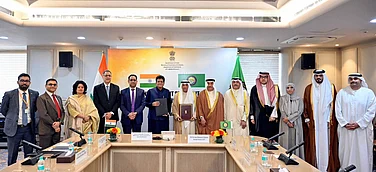Speaking on recently amended Information Technology Rules (IT Rules) that paved way for a government fact-checking body, Union Minister of State for Electronics and IT Rajeev Chandrasekhar said a large part of misinformation has been directed towards the government in the last two or three years.
Last week, the Union government notified amendments to IT Rules, 2021, which paved way for a body that would flag "fake" content about the government. The amendments also make it "obligatory" for intermediaries such as social media platforms to "not to publish, share or host fake, false or misleading information" about the Union government. Tee content that falls into this criteria will be flagged by a government body yet to be notified.
The amendments came under immediate criticism from the Editors Guild of India (EGI) and independent press freedom advocates.
"When you do an analysis over the last....two-three years, a large part of the misinformation operations have always been directed against the government," Chandrasekhar said.
Chandrasekhar cited a Washington Post story which talks about Khalistani bots and accounts posting fake information about the government.
He said, "Misinformation directed towards the government needed to be addressed. This was a request not just by the users of the internet, but also the intermediaries who now have to comply with Rules...and because it was government information and government facts, it cannot be a fact-checking unit outside the government because they'll never have access to the information."
The EGI has said that it was "deeply disturbed" by the "draconian" amendments to the Information Technology Rules that gave the government "absolute power" to determine fake news. In a statement, it urged the government to withdraw the Information Technology (Intermediary Guidelines and Digital Media Ethics Code) Amendment Rules and hold consultations with media organisations and press bodies, as it had promised earlier.
The EGI said as per the rules, the IT Ministry has given itself the power to constitute a "fact-checking unit", which will have sweeping powers to determine what is "fake or false or misleading", with respect to "any business of the Central Government".
Non-profit digital rights group Internet Freedom Foundation (IFF) has said that assigning any unit of the government such arbitrary powers to determine the authenticity of online content bypasses the principles of natural justice, thus making it an unconstitutional exercise.
"The notification of these amended rules cement the chilling effect on the fundamental right to speech and expression, particularly on news publishers, journalists, activists, etc," IFF said.
Internet firms like Google, Facebook and Twitter may lose protection under safe harbour if they fail to remove content identified by the government-notified fact-checker as false or misleading information.
Internet and social media platforms, such as Google, Facebook, Twitter and internet service providers etc, fall within the ambit of an intermediary. The safe harbour clause protects intermediaries from legal action on them for any objectionable content posted online by their users.
(With PTI inputs)






















